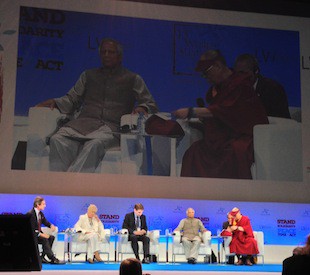Read this article in Spanish here.
WARSAW, POLAND. During the concluding session at this year’s World Summit of Nobel Peace Laureates, His Holiness the XIV Dalai Lama, Betty Williams, Prof. Dr. Muhammad Yunus and Peter Launsky-Tieffenthal came together to debate “Youth in Solidarity: Be an Advocate for Peace.”
Betty Williams, who was awarded the Nobel Peace Prize in 1977 for her work for peace and a nonviolent solution to the ethnic-political conflict in Northern Ireland, an award she shares with Mairead Corrigan-Maguire, argued that it is a fallacy to say that “if we are armed sufficiently, no one will attack us.” According to Williams, young people should be fighting for 1% of the military budget.
“Peace isn’t just going to happen. You need to work for it. Don’t tell me there is nothing you can do. There is something every human being can do.”
Prof. Dr. Muhammad Yunus complemented the discussion arguing that before becoming an advocate of peace, one needs to be a practitioner. Young people, according to Yunus, need fantasies. Imagine that world, and make it happen.
Specifically, he drew attention to Bangladesh and the fact that women there continue to work at clothing factories for 11 cents per hour. Pushing up the price of a Bangladesh-made T-shirt by one dollar would allow these workers to double their wage. Yunus is now working on a social business, recognizable by a “Happy Workers Tag,” as his entrepreneurial model would ensure job security, a pleasant working environment, provide day care, pensions and other benefits. He is already talking to fashion houses and designers so that they will design only for Happy Workers factories.
“People would pay more if you tell the whole story.”
Peter Launsky-Tieffenthal, Under-Secretary-General for Public Information at the United Nations,
proposed specific examples of young people who are fighting for peace, such as those behind wearepeace.org. He also brought the conversation back to Syria, underlining the UN’s four primary roles:
- To provide independent experts, such as chemical weapons experts.
- To support the humanitarian tragedy of refugees
- To bring leaders together in a political dialogue
- To deal with impunity and make sure those responsible are held responsible.
“Disarmament is more than just dialogue.”
The final question asked all four members of the discussion to provide a word of advice to young people growing up today. While Betty Williams argued that young people should never allow anyone to remove their dream, Peter Launsky-Tieffenthal incited advocates to always ask themselves, “Does what I am doing make a difference?” Prof. Dr. Muhammad Yunus, in turn, mentioned that we should “see poverty only in the museum” and that “there should be no unemployment.”
His Holiness the XIV Dalai Lama concluded, “I have nothing to add.” Optimism, to him, is more important than external appearances.
“Inner beauty is more important. Without that, your marriage may be only a few years.”
Continue reading about the 13th World Summit of Nobel Peace Laureates here.

